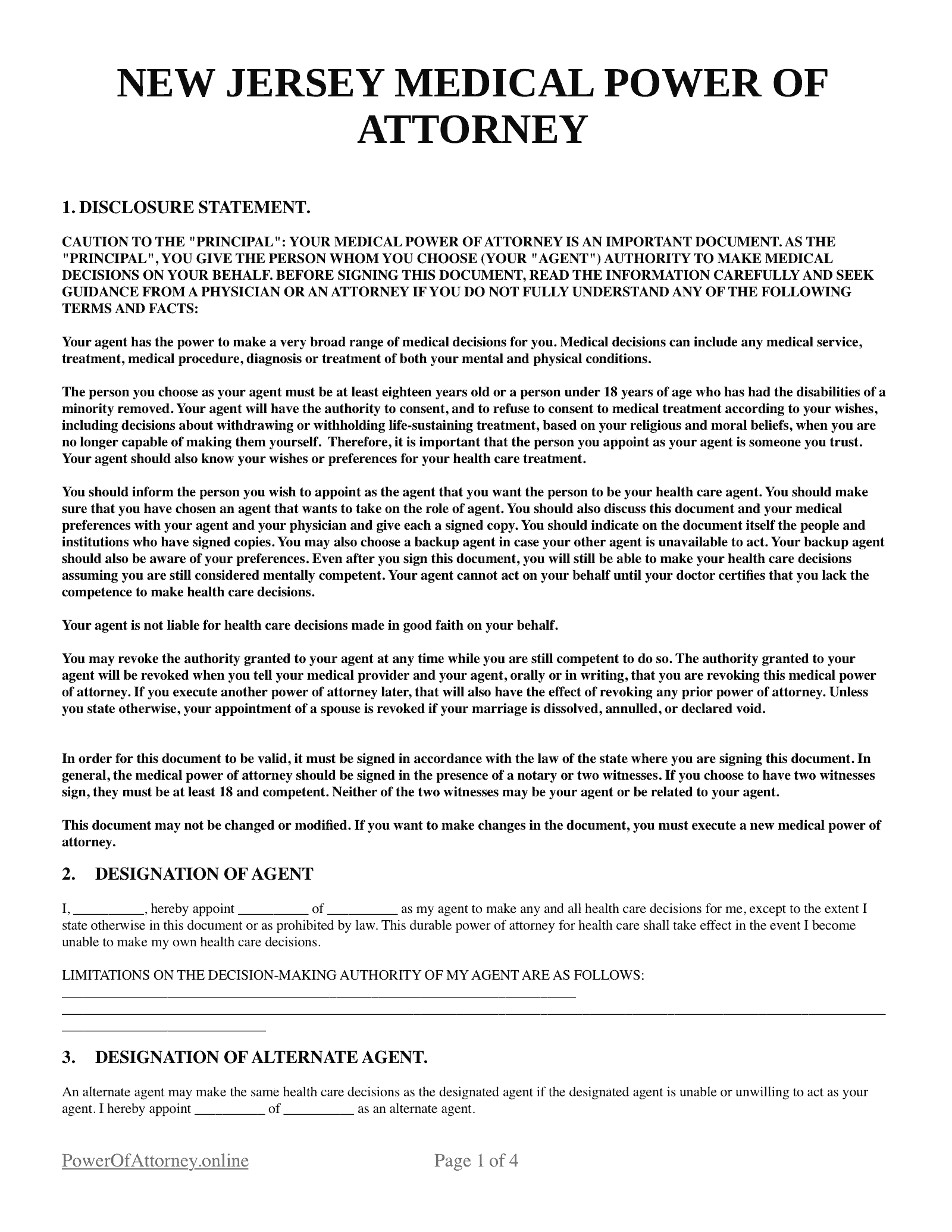Free New Jersey Medical Power of Attorney Forms
A medical power of attorney (POA) is a legal document that authorizes a person, officially referred to as the agent or attorney-in-fact, to make healthcare decisions on behalf of another person known as the declarant or principal.
The decisions may range from treatment options to end-of-life care.

New Jersey Medical Power of Attorney Laws
- New Jersey Statutes § 26:2H-53-77 - Also known as the New Jersey Advance Directives for Health Care Act, the sections indicate provisions relevant to medical POAs. For example, Section 26:2H 56 states: “A declarant may execute an advance directive for healthcare at any time” (NJ Rev Stat § 26:2H-56).
Signing Requirements in New Jersey
In the case of an advance medical POA, which is used if the patient becomes unexpectedly incapacitated, the law states: “The advance directive shall be signed and dated by, or at the direction of, the declarant in the presence of two subscribing adult witnesses, who shall attest that the declarant is of sound mind and free of duress and undue influence” (NJ Rev Stat § 26:2H-56).
The form must also be acknowledged by a notary public.
How To Write a Medical POA in New Jersey
The declarant or principal can write their own medical POA, but the template must follow New Jersey standards and statutes.
Here are the steps to creating the form:
1. Identify your agent
The role of the agent or attorney-in-fact is crucial to the medical POA. They will make life-altering decisions, such as treatments, medications, healthcare arrangements, surgery needs, and end-of-life options.
The agent must be someone you trust with your life and who will do right by you. Principals usually choose a family member or close friend to become their agent.
A patient may also choose more than one agent. According to New Jersey Statutes: “A declarant may designate one or more alternate health care representatives, listed in order of priority. In the event the primary designee is unavailable, unable, or unwilling to serve as health care representative, or is disqualified from such service pursuant to this section or any other law, the next designated alternate shall serve as health care representative” (NJ Rev Stat § 26:2H-58).
2. Talk to your agent about your wishes
After identifying an agent or agents, ask for their permission to be on your medical POA. They must be willing to take on the role and understand the responsibility bestowed on them.
After getting their approval, enumerate your wishes, including your choice of residence (at home with a live-in nurse or assisted-living facility or nursing home) and your doctors and healthcare providers.
Be honest with your agent about what you want in terms of treatments, medications, and end-of-life options. They will follow through on these choices if you become incompetent and unable to make them for yourself.
You must also discuss compensation. An agent can be compensated for their responsibilities and reimbursed for expenses while performing their duties.
3. Download and print a New Jersey medical POA
Download a printable medical POA form that is acceptable in New Jersey. The template contains spaces where you can specify the powers of your agent.
4. Sign the document
You must sign the New Jersey medical POA before two witnesses who can attest to your competency during the act. Your agent or attorney-in-fact cannot be one of the two witnesses. Moreover, the document must be attested by a notary public in New Jersey.
The form is now legal, and the agent can start acting on your behalf unless the medical POA is for a later date.